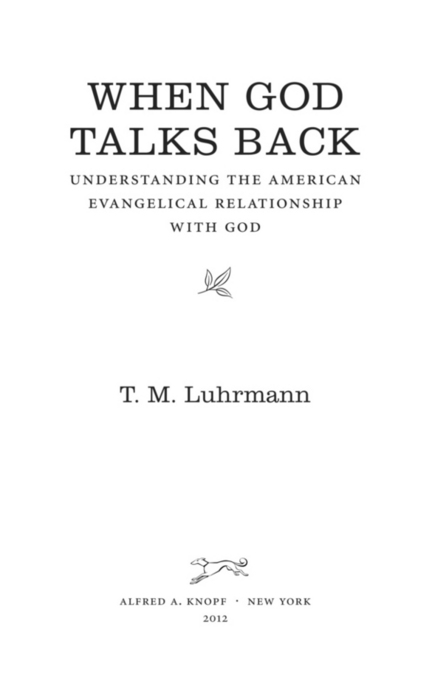THIS IS A BORZOI BOOK
PUBLISHED BY ALFRED A. KNOPF
Copyright 2012 by Tanya Luhrmann
All rights reserved. Published in the United States by Alfred A. Knopf,
a division of Random House, Inc., New York, and in Canada
by Random House of Canada Limited, Toronto.
www.aaknopf.com
Knopf, Borzoi Books, and the colophon are
registered trademarks of Random House, Inc.
Owing to limitations of space, all acknowledgments for permission to
reprint previously published material may be found following the index.
Library of Congress Cataloging-in-Publication Data
Luhrmann, T. M. (Tanya M.), [date]
When God talks back : understanding the American evangelical
relationship with God / by T. M. Luhrmann. 1st ed.
p. cm.
eISBN: 978-0-307-95750-4
1. Vineyard Christian FellowshipCase studies.
2. EvangelicalismPsychologyCase studies.
3. Psychology, ReligiousUnited StatesCase studies. I. Title.
BX 8785. L 84 2012
277.3083dc23 2011040116
Jacket photograph by Don Hammond/Aurora Photos
Jacket design by Jason Booher
v3.1
for Richard
CONTENTS
A NOTE ON QUOTATIONS
I have had hundreds of conversations with evangelicals. I have many notebooks scrawled with journal entries, and a stack, about six feet high, of notes and transcripts (not to mention another twelve feet, or thirteen thousand pages in files, of transcript material from the experiment I ran). I adhere closely to the transcripts in my quotations, but my quotations are often not exact. When we speak out loud, we use language differently from the way we do when we write, and the written form of spoken speechthe transcriptese that types out the grunts, verbal gestures, and conversational hedges of ordinary talkcan make people sound more foolish and more hesitant than they are. Linguistic anthropologists are of course intensely interested in these verbal infelicities, and to them I apologize. I believe I have retained the sense of the speakers words. This is an example of the way I have made the quotations more reader-palatable:
THE ORIGINAL: I will retreat, like go into the bedroom, close the door and sit on my bed for like an hour and just see what happens and like commune with God. My husband will be like on the other side of the house and wont interrupt me or anything like that.
THE WAY THE QUOTATION APPEARS IN THE BOOK: I will retreat into the bedroom, close the door, and sit on my bed for like an hour and just see what happens, commune with God. My husband wont interrupt me.
Biblical quotations are usually from the New Revised Standard Edition or the New International Version, but sometimes from the glorious King James.
PREFACE
This book begins with a few simple questions. How does God become real for people? How are sensible people able to believe in an invisible being who has a demonstrable effect on their lives? And how can they sustain that belief in the face of what skeptical observers think must be inevitable disconfirmation? This book answers these questions by taking an outsiders perspective into the heart of faith through an anthropological exploration of American evangelical Christianity.
It ought to be difficult to believe in God. God is invisible. You cannot shake Gods hand, look God in the eye, or hear what God says with your ears. God gives none of the ordinary signs of existence. The sacred books are full of impossible contradictions, apparently absurd beliefsinvisible fathers, talking snakes, a dead man who comes to life and flies up to heaven.
And yet of course people do believe in God. According to a Gallup poll, roughly 95 percent of Americans say that they believe in the existence of God or a higher power, a percentage that has remained steady since Gallup began polling on the eve of the Second World War. In 2008 the Pew Foundation conducted a quite extensive representative survey. In its sample, two-thirds of Americans completely or mostly agreed that angels and demons are active in the world today, and nearly one-fifth said that they receive a direct answer to a specific prayer request at least once a week. Many Americans not only believe in God in some general way but experience God directly and report repeated contact with the supernatural.
People who do not believe in God look at these statistics and conclude that if so many people believe in something for which there is no evidence, something about the belief process must be hardwired and belief must have arisen because it serves some other, more useful end. The new field of evolutionary psychology argues that many of the building blocks of our psyche were formed through a slow evolutionary process to adapt us to a dangerous, unpredictable world. When we hear a noise in the next room, we immediately wonder about an intruder even when we know the door is locked. Thats to our advantage: the cost of worrying when no one is there is nothing compared to the cost of not worrying when someone is. As a result, we are primed to be alert for presence, whether anyone is present or not.
Faced with these findings, some are tempted to argue that the reason people believe in supernatural beings is that our evolved intuitions lead us to overinterpret the presence of intentional agents, and those quick, effortless intuitions are so powerful that they become, in effect, our default interpretation of the world. From this perspective, the idea of God arises out of this evolved tendency to attribute intention to an inanimate world. Religious belief would then be an accidental by-product of the way our minds have evolved. That, in a nutshell, is what a flood of books on religion argueBreaking the Spell, Religion Explained, Faces in the Cloudsand those reading them sometimes conclude that anyone with logical training and a good education should be an atheist.
That conclusion is shortsighted. Evolutionary psychology looks only at part of the puzzle. It describes the way our intuitions evolved and explains why claims about invisible agents seem plausible, and why certain ideas about God are found more often in the world than others. But evolutionary psychology does not explain how God remains real for modern doubters. This takes faith, which is often the outcome of great intellectual struggle.
Faith asks people to consider that the evidence of their senses is wrong. In various ways, and in varying degrees, faith asks that people believe that their minds are not always private; that persons are not always visible; that invisible presences should alter their emotions and direct their behavior; that reality is good and justice triumphant. These are fantastic claims, and the fact of their improbability is not lost on those who accept themparticularly in a pluralistic, self-aware society like twenty-first-century America. Many Christians come to their religious commitments slowly, carefully, and deliberatively, as if the attitude they take toward life itself depends upon their judgment. And they doubt. They find it hard to believe in an invisible beinglet alone an invisible being who is entirely
They have always struggled. In earlier centuries, before atheism became a real cultural possibility, they may have struggled more about the nature of the supernatural than about whether the supernatural existed at all, but they struggled. Augustine agonized. Anselm despaired. The long tradition of spiritual literature is full of intense uncertainty about the true nature of a being that can be neither seen nor heard in the ordinary way. And whether or not people ever voice the fear that God himself is an empty fantasy, whether or not they tussle with theology, Christians of all ages have wrestled with the difficulty of believing that God is real for them in particular, for their own lives and every day, as if the promise of joy were true for other peoplebut not for themselves. That is why one of the oldest stories in the Hebrew Bible has become iconic for the process of coming to commitment.









